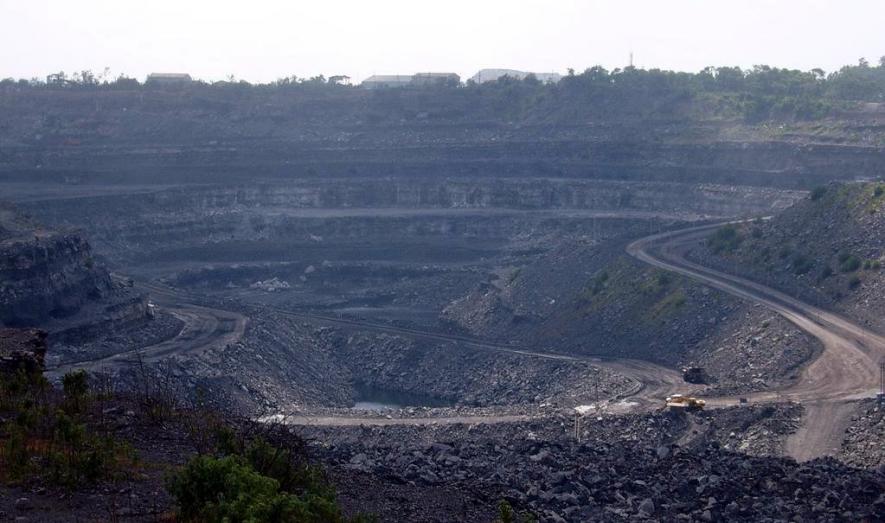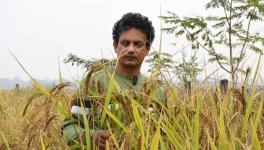Mamata Banerjee’s ‘Game Changer’ Coal Mining Project to Face Resistance

Coal Mining in India. Representational Image
New Delhi: Ahead of the 2021 Assembly polls, the Mamata Banerjee-led West Bengal government is pitching the Deocha-Pachami coal block as a game-changer for the state’s economy, but the project is expected to face resistance from more than just the local tribal population.
Questions have begun to be raised over the fate of minor minerals that occupy large parts of the topsoil of the coal block area and the workers involved in the extraction of the minerals.
The claims of the Trinamool Congress (TMC) state government that the Deocha-Pachami coal block alone will generate employment for at least one lakh people is also being questioned given the poor past record of the coal mining industry in the field of job creation.
The coal block area measuring approximately 12.31 square kilometres in Birbhum district, which was allotted to West Bengal government in December 2019, has numerous stone quarries operating over it. Boulders extracted from these quarries are graded into different sizes in crushers and transported to cities including Kolkata, Siliguri, Malda, Murshidabad, Asansol and Vardhaman for use in the construction industry.
As per locals, many of the stone quarries have been operating without the consent of the district administration. Nevertheless, the quarries provide employment to a sizeable section of the local population, and thus, is sure to create hindrance in the way of the coal mining project.
“Is there any back-up plan in place for those employed in the quarries or will they be thrown out of jobs with the closure?” asked said Swaraj Das, General Secretary, Project Affected People’s Association of Deocha-Pachami. “The issue is not alone about the displacement of the tribal and Dalit population living in the coal block for decades. Black stone occupies the top stratum of the soil in the coal block area. Along with the coal reserves, has the central government given away the massive quantity of minor minerals, that is, black stones, as a gift to the state government agency that has been allotted the block?” he said. Das also pointed out that it was not clear what will be done with the black stones once those are removed for extracting coal.
When contacted, the district administration of Birbhum, as well as the West Bengal Power Development Corporation Limited (WBPDCL) that has been allotted the coal block for captive mining, claimed to have no official estimates on the number of stone quarries operating in the coal block region.
The West Bengal government has been treading cautiously on the project fearing a backlash from the local population over issues of displacement due to the proposed open cast mining. The local tribal population has already been resisting the project because although most of them have been living in the region with land deeds, their tenancy has allegedly not been updated in revenue records.
“The stone quarries operating in the area are already a health hazard resulting in numerous ailments among the local population,” Mohammed Salim, politburo member of the Communist Party of India (Marxist), told the NewsClick. He said the issues regarding the Deocha-Pachami coal mining project are threefold – environmental issues, health hazards and problems surrounding land and tribal habitations. “The Mamata Banerjee government should have first come out with a clear-cut policy on the operational aspects of the project. It is not clear as to whether the coal will be extracted with the help of a government agency, or a private agency appointed as a Mine Developer and Operator or through a public-private partnership mode. The claim that one lakh jobs will be created through the project has also to be substantiated with facts,” Mohammed Salim said.
An email sent to Dr PB Salim, Managing Director of West Bengal Power Development Corporation Limited, on behalf of NewsClick, regarding the mode of operating the mines, amongst other queries, is yet to elicit any response. During the formal announcement of the mining project in September last year, West Bengal Chief Minister Mamata Banerjee had said that the project has the potential to generate jobs for one lakh people.
A detailed mining plan, which will more or less determine the exact estimation of employment generation potential of the project is yet to be prepared. As per surveys conducted through satellite imagery in the 1980s by Geological Survey of India, the coal block is estimated to hold reserves of around 1,159 million metric tons of coal. It is on the basis of this estimate that the coal block is touted as being the second largest in Asia.
A senior official of the coal block allottee, that is, the WBPDCL, told this correspondent on conditions of anonymity that a new survey will be conducted to ascertain the exact volume of extractable mineral in the block.
The official said, “A survey to conduct the exact volume of coal in the block is likely to be conducted either through the public sector Central Mine Planning and Design Institute Limited or by an international agency by issuing a global tender. The plan, as to whether coal will be mined through the open cast method, or the underground drilling method or by a combination of both methods, can be put in place only after the survey is completed.” He further added, “As far as the numerous stone quarry operators are concerned, they stand to gain from the coal mining project as they will get a readymade feed of the mineral for their crushing units without even having to dig. Otherwise, the extracted black stone will pose a huge challenge for the mine operator in terms of storage space.”
As per experts, the Deocha-Pachami coal block is a fairly unique instance where the upper crust of the soil is rich in minor minerals. Regulation of mines and minerals is a state subject according to the Constitution of India unless any particular case is placed under the control of the central government through laws enacted by the Parliament in view of larger public interest. Thus, while the allocation of the Deocha-Pachami coal block was in the hands of the central government, control over black stones in the region lies in the hands of the West Bengal government.
“This is an instance where the upper soil is not only valuable in terms of its mineral resources but is also difficult to mine because of the hard crust,” former Coal India Limited Chairman Partha Sarathi Bhattacharya told NewsClick, adding, “It is a different ball game altogether and some kind of an informal arrangement has to be worked out in order to get value for the minerals in the upper crust. The project will generate substantial employment but the exact estimates of job creation would depend on the process of mining that will be adopted.
The writer is an independent journalist.
Get the latest reports & analysis with people's perspective on Protests, movements & deep analytical videos, discussions of the current affairs in your Telegram app. Subscribe to NewsClick's Telegram channel & get Real-Time updates on stories, as they get published on our website.
























